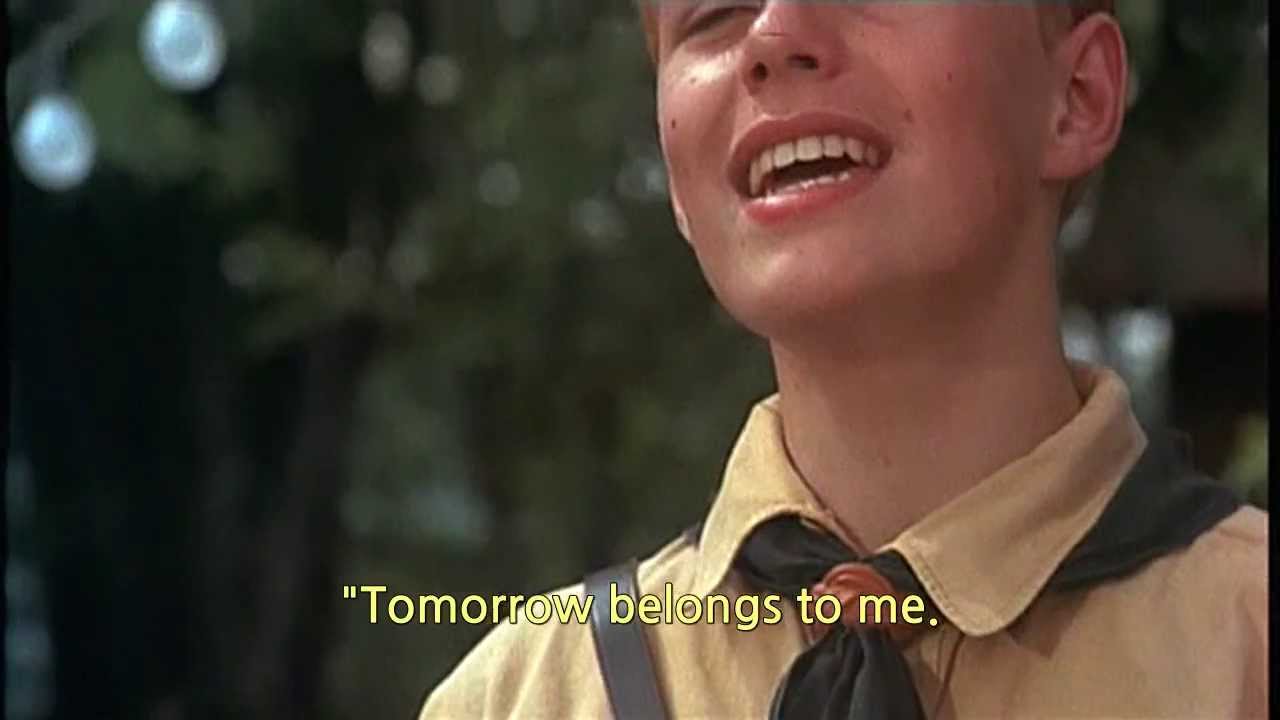Monday
It so happened that Sewanee’s theater department was staging Cabaret this past weekend. On Saturday night we watched it while still grappling with the Squirrel Hill horror, which occurred near a Jewish community center that my oldest granddaughter used to visit. At one point during the production, I felt like I was at a Donald Trump rally.
During a double engagement party for protagonists Sally Bowles/Clifford Bradshaw and landlady Schneider/Jewish tenant Schultz, one of guests arrives wearing a Nazi armband. By the end of the scene, all except for the guests of honor are singing “Tomorrow Belongs to Me.” Since planted actors were sitting amongst us at the cabaret tables, it felt as though we were engulfed in an anti-Semitic wave:
The sun on the meadow is summery warm.
The stag in the forest runs free.
But gather together to greet the storm.
Tomorrow belongs to me.
The branch of the linden is leafy and green,
The Rhine gives its gold to the sea.
But somewhere a glory awaits unseen.
Tomorrow belongs to me.
The babe in his cradle is closing his eyes
The blossom embraces the bee.
But soon, says a whisper;
“Arise, arise,
Tomorrow belongs to me.”
For a while in American political discourse, it has been inappropriate to use Nazi analogies given that they sound hysterical and make rational assessment difficult. Their use makes more sense, however, when Trump himself signals to neo-Nazis and other protofascists that he sympathizes with them.
An early indication was his describing some of those Charlottesville marchers who chanted, “Blood and soil!” and “Jews will not replace us!” as “very fine people.” That was only the tip of the iceberg, however, as Washington Post’s Dana Milbank notes:
Donald Trump and his surrogates have been playing footsie with American neo-Nazis for months: tweeting their memes, retweeting their messages, appearing on their radio shows. After an Oct. 13 speech in which Trump warned that Hillary Clinton “meets in secret with international banks to plot the destruction of U.S. sovereignty” and that “a global power structure” is conspiring against ordinary Americans, the Anti-Defamation League urged Trump to “avoid rhetoric and tropes that historically have been used against Jews.”
Well, Trump just gave his reply. On Friday, he released a closing ad for his campaign repeating offending lines from that speech, this time illustrated with images of prominent Jews: financier George Soros (accompanying the words “those who control the levers of power”), Fed Chair Janet Yellen (with the words “global special interests”) and Goldman Sachs CEO Lloyd Blankfein (following the “global power structure” quote). The ad shows Hillary Clinton and says she partners “with these people who don’t have your good in mind.”
Washington Post’s Karen Tumulty makes a similar point:
In the Trump era, people who should be shunned are embraced, and made practically mainstream. Some who call themselves our political leaders even go out of their way to do it. This month, Rep. Steve King (R-Iowa) ventured into Canadian politics with an endorsement of Faith Goldy, a white-supremacist fringe candidate running for mayor of Toronto.
Tumulty points out that King “later said he was not aware of her white-nationalist sentiments, which included a recommendation that her followers read a 1937 book that called for the elimination of Jews.” But that didn’t keep him from taking a special trip to Europe to mean with Austrian protofascists.
Now we have a mass murderer and a wannabe murderer citing beliefs that elite Jews are financing Central American caravans to invade white America. Such people feel supported by Trump when he plays white grievance politics and calls himself a “nationalist.”
In Cabaret, one sees what happens when people fail to push back against fascist rhetoric. The landlady is an average German who generally steers clear of politics, but with the rise of anti-Semitism, she isn’t forceful enough to fight what is happening. In the play’s saddest moment, she rejects her one shot at love because Schultz is a Jew. To capture the pathos, I cite first the song by which Schultz woos her, followed by her later explanation as to why she runs away:
Schultz: You hesitate because you have never been married. It frightens you. Believe me, it can work wonders…
How the world can change
It can change like that-
Due to one little word:
“married”.
See a palace rise
From a two room flat
Due to one little word:
“Married”.
And the old despair
That was often there
Suddenly ceases to be
For you wake one day,
Look around and say:
Somebody wonderful married me.
Towards the end of the play she references the “Tomorrow” song to explain her change of mind:
With a storm in the wind,
What would you do?
Suppose you’re one frightened voice
Being told what the choice must be.
Go on; tell me,
I will listen.
What would you do?
If you were me?
If life before World War II was a cabaret, then today it is a reality television show. Why focus on sordid facts when it’s much more fun to engage in political theater? Fun, that is, if it’s other people being slaughtered.
To be clear, I don’t think we’re in Nazi territory yet. While Hitler too relied on acts of violence from fanatical followers, we have stronger institutional checks than Weimar Germany did. Cabaret may function more as a warning than as a prediction that history is about to repeat itself.
After the bloodiest day for Jews in American history, however, I say that with a little less confidence.


